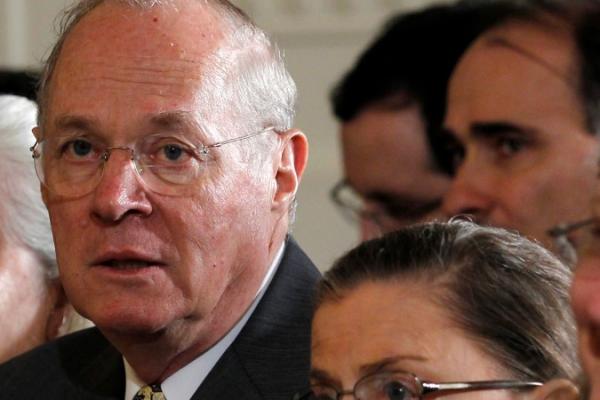Supreme Court Justice Anthony Kennedy said on Wednesday he plans to retire after three decades as a pivotal vote on the highest U.S. judicial body, giving President Donald Trump an opportunity to make the court more firmly conservative.
The conservative Kennedy, who turns 82 in July and is the second-oldest justice on the nine-member court, has become one of the most consequential American jurists since joining the court in 1988 as an appointee of Republican President Ronald Reagan. He proved instrumental in advancing gay rights, buttressing abortion rights and erasing political spending limits. His retirement takes effect on July 31, the court said.
"It has been the greatest honor and privilege to serve our nation in the federal judiciary for 43 years, 30 of those years on the Supreme Court," Kennedy said in a statement.
The statement issued by the court said that Kennedy's decision was motivated by his decision to spend more time with his family.
"He is a man that I've known for a long time and a man that I've respected for a long time. He's been a great justice of the Supreme Court. He's a man ... who has displayed tremendous vision, and tremendous heart, and he will be missed," Trump told reporters in the White House Oval Office.
Trump said he will begin a search immediately for a new justice, with a list of 25 candidates.
Kennedy is a traditional conservative who sometimes joined the liberal justices on key rulings, earning a reputation as the court's "swing" vote who heartened conservatives and liberals alike, depending on the issue.
His retirement was disclosed on the final day of the court's current term, which began in October.
Kennedy on Tuesday joined the court's four other conservatives in giving Trump a huge legal victory by upholding the Republican president's travel ban targeting people from several Muslim-majority countries. On Wednesday, he joined his fellow conservative justices in a 5-4 ruling that dealt a major setback to organized labor by shutting off a key union revenue source.
Trump already has left an imprint on the court, restoring its 5-4 conservative majority with the appointment of Justice Neil Gorsuch last year after the president's fellow Republicans in the Senate in 2016 refused to consider Democratic former President Barack Obama's nominee, Merrick Garland.
While Kennedy's replacement will not change the numerical ideological balance on the court, Trump could appoint a justice who would be more staunchly conservative than Kennedy and less likely to occasionally side with the court's liberal wing. The move could also mean that conservative Chief Justice John Roberts, as the most centrist of the court's current conservatives, will become the decisive vote in certain cases.
While Kennedy sided with conservative colleagues on many issues and authored the landmark 2010 ruling that allowed unlimited corporate spending in political campaigns, his tenure also included strong support for the liberal cause of gay rights.
MAJOR SOCIAL ISSUES
Without Kennedy on the bench, the high court could move to the right on major social issues including abortion and gay rights. Kennedy wrote the landmark 2015 ruling that legalized same-sex marriage nationwide.
Conservative activists have long dreamed of building a firmly conservative majority on the court that would push to overturn the landmark 1973 ruling in the case Roe v. Wade that legalized abortion nationwide.
Kennedy disappointed conservatives by joining Supreme Court decisions that affirmed the Roe decision, including a landmark 1992 ruling in the case Planned Parenthood v. Casey.
Gorsuch already has demonstrated that he is one of the most conservative members of the court, aligning himself with Justices Clarence Thomas and Samuel Alito.
The U.S. Senate, which must confirm nominees before they can join the court, is controlled 51-49 by Trump's fellow Republicans, meaning that if they remain unified they can overcome any Democratic opposition like that mounted against Gorsuch. Senate Republicans changed the chamber's rules during the Gorsuch nomination battle to prevent Democrats from insisting on a 60-vote super-majority, allowing court nominees to win confirmation by a simple majority vote.
Senate Majority Leader Mitch McConnell, a Republican, said there would be a vote on Trump's nominee "this fall," but did not specify whether it would come before the court's new term starts in October or before the November mid-term elections.
Kennedy personally delivered his retirement letter to the White House on Wednesday afternoon, after he told his fellow justices of his plans at their afternoon conference.
Trump picked Gorsuch from a list of names, mostly conservative federal appeals court judges, he circulated during his 2016 election campaign. The White House last November issued an expanded list that includes other prominent conservatives, including Judge Brett Kavanagh, a former Kennedy law clerk who serves on the U.S. appeals court in Washington.
Other names on the list include appeals court judges Amy Coney Barrett and Kevin Newsom, who were both appointed to their current positions by Trump.
Trump's adviser for judicial nominations, Leonard Leo, said Trump's list includes some of the best judges in the United States. "I expect the nominee to be like Justice Gorsuch, to demonstrate excellence in every respect, and to earn widespread support from the American people, and bipartisan support for confirmation in the Senate," Leo said.
Kennedy, mild-mannered and professorial, followed a thoughtful, middle-of-the-road approach and often posed probing, intellectual questions of lawyers arguing cases. He became the swing vote on the ideologically divided court after fellow centrist conservative Justice Sandra Day O'Connor retired in 2006.
Kennedy was Reagan's third choice to fill the court seat left open by the retirement of Lewis Powell in 1987. The Senate rejected Reagan's first nominee, outspoken conservative Robert Bork, in a fierce partisan fight and second choice Douglas Ginsburg withdrew after admitting to past marijuana use.
Got something to say about what you're reading? We value your feedback!





